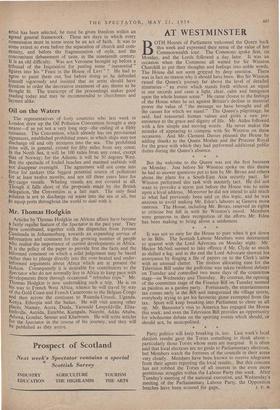AT WESTMINSTER
BOTH. Houses of Parliament welcomed the Queen back this week and expressed their sense of the value of her Commonwealth tour. The Commons spoke first, on Monday, and the Lords followed a day later. It was an occasion when the Commons all waited for Sir Winston Churchill to put their thoughts and feelings into noble words. The House did not seem gripped by deep emotion. There was in fact no reason why it should have been. But Sir Winston raised the Queen's journey far above the level of detailed itineraries—" an event which stands forth without an equal in our records and casts a light, clear, calm and benignant upon the whole human scene." He came closest to the feelings of the House when he set against Britain's decline in material power the value of " the message we have brought and all the causes for which we stand." The Queen's pilgrimage, he said, had reasserted human values and given a new pre- eminence to the grace and dignity of life. Mr. Attlee followed with a few simple and moving words. He never makes the mistake of appearing to compete with Sir Winston on these occasions. And Mr. Clement Davies pleased the House by adding thanks to the Queen Mother and the Princess Royal for the grace with which they had performed additional public duties during the Queen's absence.
But the welcome to the Queen was not the first business on Monday. Just before Sir Winston spoke on this theme he had to answer questions put to him by Mr. Bevan and others about the plans for a South-East Asia security pact. Sir Winston performed this task with masterly tact. He did not want to provoke a storm just before the House was to unite upon a loyal address. Moreover he did not intend to add much to what had previously been said on this topic, and he was anxious to avoid making Mr. Eden's labours at Geneva more onerous. The House, including Mr. Bevan, reserved its rights to criticise but fell in with Sir Winston's mood. Members were generous in their recognition of the efforts Mr. Eden has been making to bring about a settlement.
* * It was not so easy for the House to purr when it got down to its Bills. The Scottish Labour Members were determined to quarrel with ' the Lord Advocate on Monday night. Mr. Hector McNeil seemed to take offence if Mr. Clyde so much as shifted a leg; and in the end the Lord Advocate showed his annoyance by flinging a file of papers on to the Clerk's table with an unusual clatter. The motion allocating time for the Television Bill under the guillotine was taken (without debate) on Tuesday and controlled two more days of the committee stage—on Wednesday and Thursday. By contrast, the opening of the committee stage of the Finance Bill on Tuesday seemed as painless as a garden party. Fortunately, the entertainments tax comes early in the Bill and inaugurated the village sports, everybody trying to get his favourite game exempted from the tax. Sport will keep breaking into Parliament to cheer us all up. Mr. Bannister's visit to America has engaged the House this week; and even the Television Bill provides an opportunity for wholesome debate on the sporting events which should, or should not, be monopolised.
* * * Party politics will keep breaking in, too. Last week's local election results gave the Tories something to think about— particularly those Tories whose seats are marginal. It is often said that local elections are no guide to Parliamentary elections, but Members watch the fortunes of the councils in their areas very closely. Members have been known to receive telegrams from their agents reporting the local results. But this concern has not robbed the Tories of all interest in the even more portentous struggles within the Labour Party this week. After Tuesday's meeting of the national executive, and Wednesday's meeting of the Parliamentary Labour Party, the Opposition benches have been scoured for gaps., J. F. B.


































 Previous page
Previous page